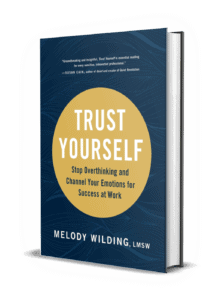Have you ever had a day when things felt off? Maybe you continually lost focus, had an utter lack of motivation, or simply couldn’t rally to get anything done. We’ve all had unproductive days here and there, but occasionally, these slumps can span days, weeks, or even months.
A single bad day is one thing, but a lingering work rut can be detrimental to your happiness, wellbeing, and career success. When you’re in a slump, you don’t produce your best work and may become disengaged from the tasks that used to excite you.
It’s possible that no one at work has noticed a change. But what if they have? You might be worried that your boss will pick up on your low productivity, and it will negatively impact your next evaluation. You know you’re not performing as well as you should, which only makes you more self-conscious and perpetuates the cycle of feeling down.
When you’re stuck in a work rut, ignoring the problem and trying to simply push through isn’t the solution. Addressing the situation head-on can provide important insight into how to avoid a similar situation in the future.
Here are four things you can do to begin bouncing back from your work rut—no matter how long you’ve been stuck in it.
1. Self-Evaluate
Take some time to think about what got you into this rut in the first place. Try to pinpoint when you first started feeling “off,” and consider what may have triggered the change.
That means examining your life outside of the office as well; it’s possible that it may not be a professional matter that’s bringing you down. Are you behind on your rent or butting heads with a difficult mother-in-law? The worries and stresses of these personal issues can follow you to the office.
On the other hand, the culprit could be your job. Not every work atmosphere is encouraging and supportive. Are you constantly criticized or underappreciated at the office? Toxic environments can be a major source of frustration and can leave you feeling drained.
As you’re sorting through what may have triggered your work slump, assess whether you’re responding to emotional or physical depletion. Getting physically worn down from working overtime six weeks in a row, for example, is significantly different than the emotional exhaustion of caring for a sick child at home.
If your rut is related to fatigue from overexerting yourself, realize that you’re feeling a normal physical response. Your body naturally downcycles after intense periods of high activity. Allowing yourself some time to rest and recover may be all that you need—but you can also boost your energy by getting more sleep, making healthier eating decisions, and setting aside time to recharge every day.
Emotional exhaustion, on the other hand, may require a different, more complex approach, such as processing through your feelings with a close friend or therapist.
2. Plan a Mini Retreat
It can be easy to lose sight of the inspiration that once motivated you if you’re mired in busywork and the daily ins and outs of your job. Without a sense of purpose, you’re more likely to feel down and shuffle aimlessly through your workday.
In short, you’ve lost sight of what drives you.
When this happens, try planning a mini retreat for yourself. Take a day or two to refocus. You don’t have to travel anywhere; simply dedicate intentional time to exploring your purpose. You can do this by asking yourself big questions like “What would I be doing if money wasn’t a problem?” or “When do I feel most alive?”
Whether you recognize your intention to move up the ranks within your current company or start your own business one day, define your “why” and commit to making it a priority. Don’t let a little bump in the road derail your ambition.
3. Focus on One Thing at a Time
You’ve got emails to respond to, an interview to plan, a financial report to write, and your boss just asked you to create an ad for a new campaign—and you’re stuck in the weekly staff meeting while none of it is getting done.
Your mind is racing through your task list. You sneak a peek at your phone and maybe even shoot off an email or two—while haphazardly keeping one ear turned in to the meeting.
Trying to juggle too many balls at once can have a paralyzing effect that results in inaction and triggers a cycle of negative self-evaluation—meaning that despite your best efforts to accomplish everything, you continue to fall further behind, which leads to feelings of inadequacy, which decrease your productivity further.
Humans possess an innate, psychological drive for mastery. Completing tasks satisfies that need and propels you forward.
With this in mind, you can reestablish momentum by regaining your focus. Get just one task done, then move on to the next. Create a prioritized to-do list and work through it systematically. This will nurture your feelings of mastery and create a positive feedback loop instead of a negative one, allowing you to lift yourself out of your productivity slump.
4. Identify the Decision You’ve Been Avoiding
Unshakable work slumps tend to crop up when the tactics you used in the past to produce successful results are no longer effective. For example, maybe you used to gain validation by always saying yes to additional work, but that no longer elicits praise from your boss.
Or, maybe you used to vent to a co-worker as a coping mechanism, but it doesn’t relieve your stress the way it used to. What worked before simply doesn’t work anymore.
Ruts of this kind always come back to a decision you need to make, but have been putting off. You might be avoiding firing difficult employee who keeps making big mistakes, or, if you’re really unhappy, you may be dodging the fact that it’s time to look for a new job.
Evading the issue, however, will not make it go away. To overcome this slump, you have to identify the decision you’ve been avoiding and act, despite the discomfort. Confronting the decision will not only resolve the issue you’ve been fretting over, but will also allow you to begin moving past your rut.
No matter what the cause of your stagnation is, you are capable of rising above it. Take the time you need to evaluate why you found yourself in the situation to begin with, use your goals to rekindle motivation, train yourself to focus, and identify the decision you’ve been avoiding so you can act. Taking these steps will help you recover from your slump and get you back to performing like the spectacular professional you are.









